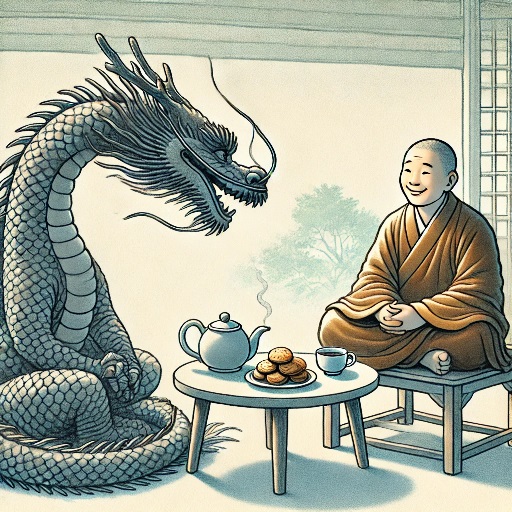
Tea and Biscuits
Generated by ChatGPT-4o/DALL-E3, 2024-09-09
My dear friends,
The third verse of Geshe Langri Tangpa's Eight Verses for Training the Mind reads:
And the moment a delusion arises
Endangering myself and others
I will firmly confront and avert it.
This might be interpreted as a direct and forceful confrontation with an afflictive emotion (klesha, or "delusion"). The late Gelek Rimpoche recommended a more skillful approach:
do not try to lock it out. Open the door and say,
"Hello, my old acquaintance. I know you well.
Please come in and have some tea and biscuits,
and we'll have a nice chat. Then please go away."
- From an oral teaching by Gelek Rimpoche
Gelek Rimpoche's metaphor illustrates a skillful approach that aligns with the precepts of both the lojong and Christian traditions.
- Geshe Chekawa, Mind Training in Seven Points (7.18)
When we allow the afflictive emotion in for tea, we are practicing examination, gently and mindfully acknowledging the emotion without suppression. Through this examination, we gain insight into the emotion's nature.
After examination, analysis takes place. This is the moment where, like a wise host, you reflect on why the emotion arose, understanding its causes and seeing its emptiness. For instance, anger might arise due to unmet expectations, but through analysis, we recognize that both the expectations and the anger are impermanent and do not define us. Just like Gelek Rimpoche’s metaphorical chat with the emotion, the process of analysis allows us to disarm the klesha, transforming the situation into an opportunity for wisdom to arise. We no longer need to forcefully resist the emotion, but by understanding its nature, we are naturally liberated from its grasp.
- Geshe Chekawa, Mind Training in Seven Points (7.2)
Chekawa’s advice here is that whenever an afflictive emotion arises, we should focus on a singular thought – Bodhicitta, the awakening mind of love, compassion and wisdom. This is in line with Gelek Rimpoche’s suggestion to offer the afflictive emotion kindness, akin to sharing tea. By offering compassion instead of resistance to the emotion, we are actively applying the antidote of bodhicitta, which suppresses the interference caused by the klesha.
- Romans 12:21
Rather than engaging in a battle with afflictive emotions (which would strengthen them by giving them attention), we invite them in and respond with compassion and understanding. This is exactly how we "overcome evil with good." Instead of resisting anger with more anger (which would lead to being overcome by it), we counteract the emotion with patience, kindness, and insight.
The integration of Gelek Rimpoche’s metaphor with the teachings of Geshe Chekawa and the Apostle Paul shows a harmonious, gentle, and wise method of working with afflictive emotions: acknowledging them, understanding them, and transforming them through love, compassion and wisdom.